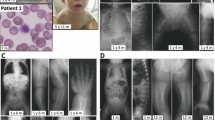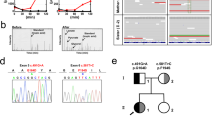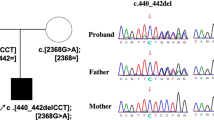Abstract
Carbohydrate-deficient glycoprotein syndrome type 1 (CDG1 or Jaeken syndrome) is the prototype of a class of genetic multisystem disorders characterized by defective glycosylation of glycoconjugates1–4. It is mostly a severe disorder which presents neonatally. There is a severe encephalopathy with axial hypotonia, abnormal eye movements and pronounced psychomotor retardation, as well as a peripheral neuropathy, cerebellar hypoplasia and retinitis pigmentosa. The patients show a peculiar distribution of subcutaneous fat, nipple retraction and hypogonadism. There is a 20% lethality in the first years of life due to severe infections, liver insufficiency or cardiomyopathy2,3,5. CDG1 shows an autosomal recessive mode of inheritance and has been mapped to chromosome 16p6,7. Most patients show a deficiency of phosphomannomutase (PMM)8, an enzyme necessary for the synthesis of GDP-mannose. We have cloned the PMM1 gene, which is on chromosome 22q13 (ref. 9). We now report the identification of a second human PMM gene, PMM2, which is located on 16p13 and which encodes a protein with 66% identity to PMM1. We found eleven different missense mutations in PMM2 in 16 CDG1 patients from different geographical origins and with a documented phosphomannomutase deficiency. Our results give conclusive support to the biochemical finding that the phosphomannomutase deficiency is the basis for CDG1.
This is a preview of subscription content, access via your institution
Access options
Subscribe to this journal
Receive 12 print issues and online access
$209.00 per year
only $17.42 per issue
Buy this article
- Purchase on SpringerLink
- Instant access to full article PDF
Prices may be subject to local taxes which are calculated during checkout
Similar content being viewed by others
References
Jaeken, J. et al. Familial psychomotor retardation with markedly fluctuating serum proteins, FSH and GH levels, partial TBG deficiency, increased serumarylsulphatase A and increased CSF protein: a new syndrome. Pediatr. Res. 14, 179 (1980).
Jaeken, J. & Carchon, H. The carbohydrate-deficient glycoprotein syndromes: an overview. J. Inher. Metab. Dis. 16, 813–820 (1993).
Jaeken, J., Matthijs, G., Barone, R. & Carchon, H. Syndrome of the month: Carbohydrate-deficient glycoprotein (CDG) syndrome type I. J. Med. Genet. 34, 73–76 (1997).
Jaeken, J. & Casaer, P. Carbohydrate-deficient glycoprotein (CDG) syndromes: a new chapter in neuropediatrics. Eur. J. Pediat. Neurol. (in the press)
Stibler, H., Blennow, G., Kristiansson, B., Lindehammer, H. & Hagberg, B. Carbohydrate-deficient glycoprotein syndrome: clinical expression in adults with a new metabolic disease. J. Neurol. Neurosurg. Psychiatry 57, 552–556 (1994).
Martinsson, T. et al. Linkage of a locus for carbohydrate-deficient glycoprotein syndrome type I (CDG1) to chromosome 16p, and linkage disequilibrium to microsatellite marker D16S406. Hum. Mol. Genet. 3, 2037–2042 (1994).
Matthijs, G. et al. Evidence for genetic heterogeneity in the carbohydrate-deficient glycoprotein syndrome type I (CDG1). Genomics 35, 597–599 (1996).
Van Schaftingen, E. & Jaeken, J. Phosphomannomutase deficiency is a cause of carbohydrate-deficient glycoprotein syndrome type I. FEBS Lett. 377, 318–320 (1995).
Matthijs, G. et al. PMM (PMM1), the human homologue of SEC53 or yeast phosphomannomutase is localized on chromosome 22q13. Genomics 40, 41–47 (1997).
Jaeken, J. et al. Sialic acid deficient serum and cerebrospinal fluid transferrin in a newly recognized syndrome. Clin. Chim. Acta. 144, 245–247 (1984).
Wada, Y. et al. Structure of serum transferrin in carbohydrate-deficient glycoprotein syndrome. Biochem. Biophys. Res. Commun. 189, 832–536 (1992).
Yamashita, K. et al. Sugar chains of serum transferrin from patients with carbohydrate deficient glycoprotein syndrome. J. Biol. Chem. 268, 5783–5789 (1993).
Jaeken, J. et al. Phosphomannomutase deficiency is the main cause of carbohydrate-deficient glycoprotein syndrome with type I isoelectrofocusing pattern of serum sialotransferrins. J. Inher. Metab. Dis. (in the press).
Lennon, G., Polymeropoulos, M & Scares, B.M The I.M.A.G.E. Consortium: an integrated molecular analysis of genomes and their expression. Genomics 33, 151–152 (1996).
Kepes, F. & Schekman, R.,Yeast SEC53 gene encodes phosphomannomutase. J. Biol. Chem. 263, 9155–9161 (1988).
Doggett, N.A. et al. An integrated physical map of human chromosome 16. Nature 377, (Suppl.), 335–365 (1995).
Chen, I.S.Y., McLaughlin, J.C., Gasson, J.C., Clark, S.C. & Golde, D.W. Molecular characterization of genome of a novel human T-cell leukaemia virus. Nature 305, 502–505 (1983).
Longmire, J.L. et al. Construction and characterization of partial digest DNA libraries made from flow-sorted human chromosome 16. Gen. Anal. Tech. Applic. 10, 69–76 (1993).
Sambrook, J., Fritsch, E.F. & Maniatis, T. Molecular cloning.A laboratory manual. 2nd Edn.(Cold Spring Harbor Laboratory Press, Cold Spring Harbor, 1989).
Author information
Authors and Affiliations
Corresponding author
Rights and permissions
About this article
Cite this article
Matthijs, G., Schollen, E., Pardon, E. et al. Mutations in PMM2, a phosphomannomutase gene on chromosome 16p13 in carbohydrate-deficient glycoprotein type I syndrome (Jaeken syndrome). Nat Genet 16, 88–92 (1997). https://doi.org/10.1038/ng0597-88
Received:
Accepted:
Issue Date:
DOI: https://doi.org/10.1038/ng0597-88



